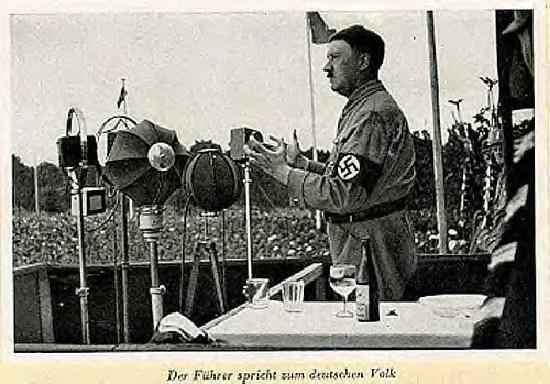
Reichstag
March 23, 1933
Caution: Adolf Hitler was completely wrong about absolutely everything...usually. When Hitler said something that was actually correct, it was merely to set up the next lie. As with all good propagandists—and he certainly was that—he would begin with a few obvious, documented facts, and then proceed to distort them horribly. At any rate, the infamous German Führer’s worm-tongue rhetoric is NOT to be taken seriously, except as a classic example of the sort of masterful demagoguery from which appropriate lessons may hopefully be learned.As always, read with an abundant degree of cautious skepticism.
In November, 1918, Marxist organizations seized the executive power by means of a revolution. The monarchs were dethroned, the authorities of the Reich and of the States removed from office, and thereby a breach of the Constitution was committed. The success of the revolution in a material sense protected the guilty parties from the hands of the law. They sought to justify it morally by asserting that Germany or its Government bore the guilt for the outbreak of the War. This assertion was deliberately and actually untrue. In consequence, however, these untrue accusations in the interest of our former enemies led to the severest oppression of the entire German nation and to the breach of the assurances given to us in Wilson's fourteen points, and so for Germany, that is to say the working classes of the German people, to a time of infinite misfortune.
The splitting up of the nation into groups with irreconcilable views, systematically brought about by the false doctrines of Marxism, means the destruction of the basis of a possible communal life.... It is only the creation of a real national community, rising above the interests and differences of rank and class, that can permanently remove the source of nourishment of these aberrations of the human mind. The establishment of such a solidarity of views in the German body corporate is all the more important, for it is only thereby that the possibility is provided of maintaining friendly relations with foreign Powers without regard to the tendencies or general principles by which they are dominated, for the elimination of communism in Germany is a purely domestic German affair.
Simultaneously with this political purification of our public life, the Government of the Reich will undertake a thorough moral purging of the body corporate of the nation. The entire educational system, the theater, the cinema, literature, the Press, and the wireless - all these will be used as means to this end and valued accordingly. They must all serve for the maintenance of the eternal values present in the essential character of our people. Art will always remain the expression and the reflection of the longings and the realities of an era. The neutral international attitude of aloofness is rapidly disappearing. Heroism is coming forward passionately and will in future shape and lead political destiny. It is the task of art to be the expression of this determining spirit of the age. Blood and race will once more become the source of artistic intuition.
Our legal institutions must serve above all for the maintenance of this national community. The irrevocableness of the judges must ensure a sense of responsibility and the exercise of discretion in their judgments in the interests of society. Not the individual but the nation as a whole alone can be the center of legislative solicitude. High treason and treachery to the nation will be ruthlessly eradicated in the future. The foundations of the existence of justice cannot be other than the foundations of the existence of the nation. The Government, being resolved to undertake the political and moral purification of our public life, is creating and securing the conditions necessary for a really profound revival of religious life.
The advantages of a personal and political nature that might arise from compromising with atheistic organizations would not outweigh the consequences which would become apparent in the destruction of general moral basic values. The national Government regards the two Christian confessions as the weightiest factors for the maintenance of our nationality. It will respect the agreements concluded between it and the federal States. Their rights are not to be infringed. But the Government hopes and expects that the work on the national and moral regeneration of our nation which it has made its task will, on the other hand, be treated with the same respect.
Great are the tasks of the national Government in the sphere of economic life. Here all action must be governed by one law: the people does not live for business, and business does not exist for capital; but capital serves business, and business serves the people. In principle, the Government will not protect the economic interests of the German people by the circuitous method of an economic bureaucracy to be organized by the State, but by the utmost furtherance of private initiative and by the recognition of the rights of property.
The Government will systematically avoid currency experiments. We are faced above all by two economic tasks of the first magnitude. The salvation of the German farmer must be achieved at all costs. Furthermore, it is perfectly clear to the national Government that the final removal of the distress both in agricultural business and in that of the towns depends on the absorption of the army of the unemployed in the process of production. This constitutes the second of the great economic tasks. It can only be solved by a general appeasement, in applying sound natural economic principles and all measures necessary, even if, at the time, they cannot reckon with any degree of popularity. The providing of work and the compulsory labor service are, in this connection, only individual measures within the scope of the entire action proposed.
We are aware that the geographic position of Germany, with her lack of raw materials, does not fully permit of economic self-sufficiency for the Reich. It cannot be too often emphasized that nothing is further from the thoughts of the Government of the Reich than hostility to exporting. We are fully aware that we have need of the connection with the outside world, and that the marketing of German commodities in the world provides a livelihood for many millions of our fellow-countrymen. We also know what are the conditions necessary for a sound exchange of services between the nations of the world. For Germany has been compelled for years to perform services without receiving an equivalent, with the result that the task of maintaining Germany as an active partner in the exchange of commodities is not so much one of commercial as of financial policy. So long as we are not accorded a reasonable settlement of our foreign debts corresponding to our economic capacity, we are unfortunately compelled to maintain our foreign-exchange control. The Government of the Reich is, for that reason, also compelled to maintain the restrictions on the efflux of capital across the frontiers of Germany.
The protection of the frontiers of the Reich and thereby of the lives of our people and the existence of our business is now in the hands of the Reichswehr, which, in accordance with the terms imposed upon us by the Treaty of Versailles, is to be regarded as the only really disarmed army in the world. In spite of its enforced smallness and entirely insufficient armament, the German people may regard their Reichswehr with proud satisfaction. This little instrument of our national self-defense has come into being under the most difficult conditions. The spirit imbuing it is that of our best military traditions. The German nation has thus fulfilled with painful conscientiousness the obligations imposed upon it by the Peace Treaty, indeed, even the replacement of ships for our fleet then sanctioned has, I may perhaps be allowed to say, unfortunately, only been carried out to a small extent.
For years Germany has been waiting in vain for the fulfillment of the promise of disarmament made to her by the others. It is the sincere desire of the national Government to be able to refrain from increasing our army and our weapons, insofar as the rest of the world is now also ready to fulfill its obligations in the matter of radical disarmament. For Germany desires nothing except an equal right to live and equal freedom. In any case the national Government will educate the German people in this spirit of a desire for freedom. The national honor, the honor of our army and the ideal of freedom must once more become sacred to the German people!
The German nation wishes to live in peace with the rest of the world. But it is for this very reason that the Government of the Reich will employ every means to obtain the final removal of the division of the nations of the world into two categories. The keeping open of this wound leads to distrust on the one side and hatred on the other, and thus to a general feeling of insecurity. The national Government is ready to extend a hand in sincere understanding to every nation that is ready finally to make an end of the tragic past. The international economic distress can only disappear when the basis has been provided by stable political relations and when the nations have regained confidence in each other.
For the overcoming of the economic catastrophe three things are necessary: 1.Absolutely authoritative leadership in internal affairs, in order to create confidence in the stability of conditions. 2.The securing of peace by the great nations for a long time to come, with a view to restoring the confidence of the nations in each other. 3.The final victory of the principles of common sense in the organization and conduct of business, and also a general release from reparations and impossible liabilities for debts and interest.
We are unfortunately faced by the fact that the Geneva Conference, in spite of lengthy negotiations, has so far reached no practical result. The decision regarding the securing of a real measure of disarmament has been constantly delayed by the raising of questions of technical detail and by the introduction of problems that have nothing to do with disarmament. This procedure is useless. The illegal state of one-sided disarmament and the resulting national insecurity of Germany cannot continue any longer.
We recognize it as a sign of the feeling of responsibility and of the good will of the British Government that they have endeavored, by means of their disarmament proposal, to cause the Conference finally to arrive at speedy decisions. The Government of the Reich will support every endeavor aimed at really carrying out general disarmament and securing the fulfillment of Germany's long-overdue claim for disarmament. For fourteen years we have been disarmed, and for fourteen months we have been waiting for the results of the Disarmament Conference. Even more far-reaching is the plan of the head of the Italian Government, which makes a broad-minded and far-seeing attempt to secure a peaceful and consistent development of the whole of European policy. We attach the greatest weight to this plan, and we are ready to co-operate with absolute sincerity on the basis it provides, in order to unite the four Great Powers, England, France, Italy, and Germany, in friendly co-operation in attacking with courage and determination the problems upon the solution of which the fate of Europe depends.
It is for this reason that we are particularly grateful for the appreciative heartiness with which the national renaissance of Germany has been greeted in Italy. In the same way, the Government of the Reich, which regards Christianity as the unshakable foundation of the morals and moral code of the nation, attaches the greatest value to friendly relations with the Holy See, and is endeavoring to develop them. We feel sympathy for our brother nation in Austria in its trouble and distress. In all their doings the Government of the Reich is conscious of the connection between the destiny of all German races. Their attitude toward the other foreign Powers may be gathered from what has already been said. But even in cases where our mutual relations are encumbered with difficulties, we shall endeavor to arrive at a settlement. But in any case the basis for an understanding can never be the distinction between victor and vanquished.
We are convinced that such a settlement is possible in our relations with France, if the Governments will attack the problems affecting them on both sides in a really broadminded way. The Government of the Reich is ready to cultivate with the Soviet Union friendly relations profitable to both parties. It is above all the Government of the National Revolution which feels itself in a position to adopt such a positive policy with regard to Soviet Russia. The fight against communism in Germany is our internal affair in which we will never permit interference from outside.
We have particularly at heart the fate of the Germans living beyond the frontiers of Germany who are allied with us in speech, culture, and customs and have to make a hard fight to retain these values. The national Government is resolved to use all the means at its disposal to support the rights internationally guaranteed to the German minorities. We welcome the plan for a World Economic Conference and approve of its meeting at an early date. The Government of the Reich is ready to take part in this Conference, in order to arrive at positive results at last.
Chancellor Adolf Hitler <—Meh! What an insufferable bore.
Twitter: @3rdReichStudies FB: Horrific 20th Century History





Disclaimer: The Propagander!™ includes diverse and controversial materials--such as excerpts from the writings of racists and anti-Semites--so that its readers can learn the nature and extent of hate and anti-Semitic discourse. It is our sincere belief that only the informed citizen can prevail over the ignorance of Racialist "thought." Far from approving these writings, The Propagander!™ condemns racism in all of its forms and manifestations.
Fair Use Notice: The Propagander!™may contain copyrighted material the use of which has not always been specifically authorized by the copyright owner. We are making such material available in our efforts to advance understanding of historical, political, human rights, economic, democracy, scientific, environmental, and social justice issues, etc. We believe this constitutes a "fair use" of any such copyrighted material as provided for in section 107 of the US Copyright Law. In accordance with Title 17 U.S.C. Section 107, the material on this site is distributed without profit to those who have expressed a prior interest in receiving the included information for research and educational purposes. If you wish to use copyrighted material from this site for purposes of your own that go beyond 'fair use', you must obtain permission from the copyright owner.
Hitler and Göring were arguing about the Jews, with Göring stating that they were quite clever people and Hitler vehemently denying they were any such thing. Finally Göring told Hitler that they should go shopping in Berlin and Göring would show Hitler it was true. Hitler agreed, so they disguised themselves and went out on the street.
Göring took Hitler into a shop, went up to the counter, and asked the clerk: "Do you have any left-handed teacups?" The clerk stared at Göring for a moment and then said no, mein herr, I do not.
The two left with Hitler complaining that he did not understand what the point of this was and Göring telling him to be patient. They went to another shop and Göring gave the same act: "Do you have any left-handed teacups?" The clerk stared and shrugged his shoulders.
They left with Hitler becoming incensed over this nonsense and Göring begging for patience. Finally they went into a Jewish shop; Göring again asked the clerk: "Do you have any left-handed teacups?"
The clerk smiled graciously, went into the back room and made a show of rummaging around, brought out a saucer and teacup, set down the saucer, and carefully placed the cup with the handle pointed so Göring could pick it with his left hand. "There you are, mein herr!" the clerk said.
Göring bought the teacup, thanked the clerk, and the two men left. Göring turned to Hitler and said: "See, I told you the Jews were very clever people."
"I don't see what was so clever about that," Hitler snapped. "He just happened to have one in stock!"


















